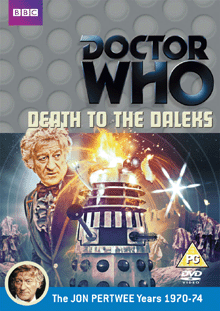 Before the days of Daleks in Manhattan and Victory of the Daleks, there used to be a maxim that having the Daleks appear in a Doctor Who story guaranteed a better than average episode.
Before the days of Daleks in Manhattan and Victory of the Daleks, there used to be a maxim that having the Daleks appear in a Doctor Who story guaranteed a better than average episode.
Watching 1974’s Death to the Daleks, it’s hard to think why.
The story starts promisingly enough with a spooky first episode, shot like a silent movie, in which the only traditionally noticeable jars are where the action shifts from studio to location. But thereafter, writer Terry Nation is satisfied to assemble a greatest hits package of his previous Dalek serials – borrowing a mining operation from The Dalek Invasion of Earth, underground creepers from The Chase and any number of interchangeable human colonists from Planet of the Daleks.
At the centre of it all is a conflict over the mineral Parrinium, but the action is so po-faced and the themes so familiar from other, better Pertwee stories that it’s hard to care.
In only her third story, Elisabeth Sladen stamps her charm all over the role of Sarah, and goes some way to providing the ‘human factor’ the story otherwise lacks. But she’s hampered by Jon Pertwee’s preening Third Doctor who chin-strokes his way through the action, seemingly oblivious to the hypocrisy when he tells Sarah off for sarcasm, and giving her the equivalent of a rosette for most improved rookie when he observes, ‘I knew that thought would occur to you sooner or later’.
The cliffhanger for the penultimate episode – moved from its original position early in Episode 4 to pad out the under-running Episode 3 – has long been derided, and it’s true that there’s little dramatic punch in the sight of… a patterned floor. But the cliffhanger to Episode 2 also falls flat, as the Doctor is attached by a – well, even the script isn’t too sure, referring to it variously as a ‘metal tentacle’, a ‘feeler’ and ‘a nasty root’.
Events improve a little in the concluding part: Arnold Yarrow’s underground Exxilon, Bellal, is a genuinely sympathetic character, and there are a couple of good scenes of zombie antibodies attacking Daleks. But it’s not quite enough to take away from the scene of a Dalek having a nervous breakdown over the small matter of letting a prisoner escape – his voice winding down with the elongated nasal burr of a histrionic Kenneth Williams.
Ultimately, as a reminder of a more innocent age, when Doctor Who painted its stories in Boys’ Own colours, there’s something to be said for Death to the Daleks. Even so, it’s hard not to feel that, with it, the Nation-style of Dalek stories had reached a dead end. It would take a new Doctor, a new script editor and the invention of Davros for things to improve..
![]()
Extras: The most charming extra by far is a featurette on the ‘60s Dalek movies, which not only has the coup of an interview with actor, Jason Flemyng – the son of their director – but also features glorious behind-the-scenes footage of Roy Castle and Peter Cushing larking about on set.
Sod’s law being what it is, this DVD release comes two weeks after the announcement of the discovery of more behind-the-scenes footage from these films. Even so, what there is here is lovely, and enlivened by Flemyng’s recollections of his father and Marcus Hearn’s compendium of facts and figures.
Compared to this, the making-of documentary is a rather dryer affair, enlivened only by director Michael E. Briant’s enthusiasm for the first episode and Dalek voice, Nick Briggs’ obvious love affair with the whole thing. Interesting behind the scenes footage finds a natural home here, but also occupies its own feature.
A commentary with a revolving cast of voices from in front of and behind the camera – among them, actors Julian Fox and Cy Town, and director Michael E. Briant – completes the set.
![]()
Released on DVD on Monday 18th June 2012 by BBC Worldwide.
What are your memories of Death to the Daleks? Let us know below…

